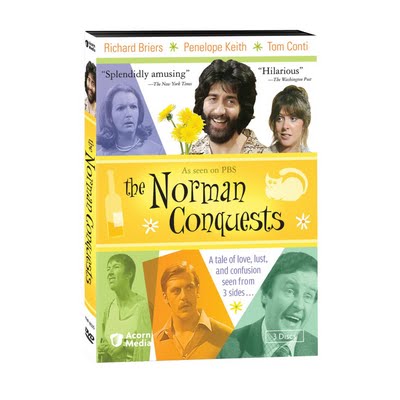
A BBC radio documentary found online this week (Ayckbourn in Action, on Radio 4) shows a side of Alan Ayckoborn not often considered by the prolific playwright’s more casual fans—namely that he’s also a prolific director. Indeed, Ayckbourn is quoted in the program saying he considers himself a director first and a writer second
The Norman Conquests. 3-DVD set from Acorn Media.
The common labeling of Alan Ayckbourn as “the British Neil Simon” isn’t entirely unfair. Both Ayckbourn and Simon are astoundingly prolific. I thought that Ayckbourn’s output had dropped off in the 21st century, but I find that he’s continued to premiere a new show every year. He also runs his own theater and directs regularly. Which puts in a whole other world than Neil Simon, who may have a Broadway venue named for him but who originally came out of television, and who did as much work in movies as he did on the stage, from the mid-‘60s onwards. Ayckbourn remains much more a man of the theater.
Yet Ayckbourn has had his TV and movie moments as well—happily for his American fans, who don’t have nearly the opportunity to follow his work that the British do. Late last year, Acorn Media released a 3-DVD set of the TV version of Ayckbourn’s The Norman Conquests, broadcast on PBS in the 1977 and not seen since.
As with Neil Simon or Woody Allen, Ayckbourn gets his pick of top comedy acting talent for his film projects. This one stars Tom Conti, who was kind of the British Elliot Gould, in the title role of Norman, and features Good Neighbors sitcom co-stars Richard Briers (also renowned for Doctor in the House and other series) and Penelope Keith (also famed for To the Manor Born) in supporting role, with the estimable Penelope Wilton, Fiona Walker and David Troughton also on hand. They’re all meaty roles, since Conquests consists of three interlocking plays which play out virtually simultaneously and take place in different areas of a British country house. When a character walks through a door out of one scene, he’s often walking into a scene in a separate play.
Ayckbourn had great commercial and critical success with this maze-like gambit and used it again when he wrote House and Garden in 1999. (Where The Norman Conquests’ trilogy simply correspond to each other, and are generally performed on alternate nights with the same cast in the same theater, House and Garden’s two parts are actually designed to be performed at the same time, before two different audiences).
You can quibble about how well he accomplishes the multi-platform idea but dismissing it as a gimmick would be ridiculous. Being able to convincingly shift dramatic perspectives is an aspiration of all playwrights; it’s the basis of Greek choruses and Shakespearean soliloquies. Ayckbourn merely allows set designers and continuity-conscious dramaturgs and stage managers to be a part of that process.
You’re aware of the device, but not so much that it distracts from the characters or dialogue. You know that the playwright has set himself a writing challenge, and you don’t mind watching him work out this puzzle.
I only wish that, besides giving his blessing to the TV version (of which Penelope Keith is the only cast member who was in the original stage production), the Ayckbourn had directed it. Herbert Wise is an accomplished TV director —with two Derek Jacoby series on his resume, I Claudius and Cadfael—and is especially adept at directing his wife, Fiona Walker, who plays Ruth. But it’s a TV sensibility rather than a theater one, with conventional shot-reverse-shots and close-ups which confine a series of plays distinctive for their interactive openess. With The Norman Conquests so seldom done due to its threefold logistics, a “stagier” version would be much more instructive to theater jerks such as myself.
What we have here instead is simply an extremely entertaining comedy. Ayckbourn is bolder and bawdier than sitcoms. He makes fun of adultery, marriage, family needs and just about every other intimate social interaction. His characters range from the insanely self-involved to the utterly clueless. This is a colorful, breezy production with the added oomph of naughtier subject on par with American soap operas.
Where The Norman Conquests does get deliriously theatrical is in its characters outsized reactions to each other in scenes where they are hiding secrets or withholding opinions. They go into laughing fits, or get falling-down drunk. It’s also not a dated or simplistic series, not a TV show in play form. I have quite sharp memories of seeing it over 30 years ago—watching Ayckbourn for three nights in a row on public television was quite an event—and it holds up wonderfully.
Now somebody revive the plays already. They’re ripe for reinterpretation.

It is the good time to outsource many different work for only a 5 buccks. Check this one